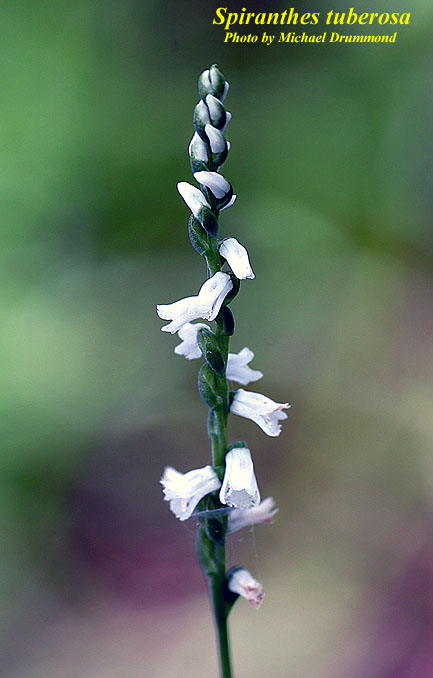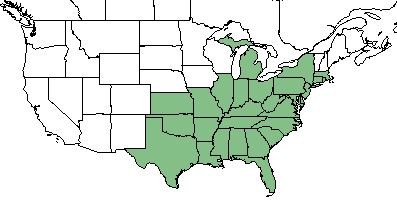Difference between revisions of "Spiranthes tuberosa"
Rwagner914 (talk | contribs) |
HaleighJoM (talk | contribs) (→Ecology) |
||
| (11 intermediate revisions by 8 users not shown) | |||
| Line 17: | Line 17: | ||
| range_map_caption = Natural range of ''Spiranthes tuberosa'' from USDA NRCS [https://plants.usda.gov/core/profile?symbol=SPTU Plants Database]. | | range_map_caption = Natural range of ''Spiranthes tuberosa'' from USDA NRCS [https://plants.usda.gov/core/profile?symbol=SPTU Plants Database]. | ||
}} | }} | ||
| + | Common Name(s): little ladies’-tresses, little pearl-twist<ref name="Weakley 2015">Weakley A. S.(2015). Flora of the Southern and Mid-Atlantic States. Chapel Hill, NC: University of North Carolina Herbarium.</ref> | ||
| + | |||
==Taxonomic Notes== | ==Taxonomic Notes== | ||
| − | ==Description== | + | Synonym(s): ''Spiranthes grayi'' Ames; ''Ibidium beckii'' (Lindley) House - misapplied |
| − | <!-- Basic life history facts such as annual/perrenial, monoecious/dioecious, root morphology, seed type, etc. --> | + | |
| + | Varieties: ''S. tuberosa'' var. ''grayi'' (Ames) Fernald; ''S. tuberosa'' var. ''tuberosa'' | ||
| + | |||
| + | ==Description== <!-- Basic life history facts such as annual/perrenial, monoecious/dioecious, root morphology, seed type, etc. --> | ||
| + | ''Spiranthes tuberosa'' is a monoecious perennial forb/herb.<ref name="USDA">USDA, NRCS. (2016). The PLANTS Database (http://plants.usda.gov, 10 January 2018). National Plant Data Team, Greensboro, NC 27401-4901 USA.</ref> | ||
| + | |||
==Distribution== | ==Distribution== | ||
| + | This species occurs in eastern portions of Kansas, Oklahoma, and Texas, eastward to Florida, northward to New York and Massachusetts, and inland to Michigan, Illinois, Indiana, and Missouri.<ref name="USDA"/> | ||
| + | |||
==Ecology== | ==Ecology== | ||
===Habitat=== <!--Natural communities, human disturbed habitats, topography, hydrology, soils, light, fire regime requirements for removal of competition, etc.--> | ===Habitat=== <!--Natural communities, human disturbed habitats, topography, hydrology, soils, light, fire regime requirements for removal of competition, etc.--> | ||
| − | < | + | ''S. tuberosa'' has been found in sandy oak barrens, oak bluffs, sandy fields, pine and oak woods, sandstone glades, meadows,<ref name="PH"> Academy of Natural Sciences of Drexel University accessed using Southeastern Regional Network of Expertise and Collections (SERNEC) data portal. URL: http://sernecportal.org/portal/collections/index.php Last accessed: June 2021. Collectors: J. J. Carter, M. L. Fernald, and Francis W. Pennell. States and Counties: Massachusetts: Barnstable, Dukes, and Nantucket. Rhode Island: Newport. Virginia: Greensville.</ref><ref name="ANHC"> Arkansas Natural Heritage Commission Herbarium accessed using Southeastern Regional Network of Expertise and Collections (SERNEC) data portal. URL: http://sernecportal.org/portal/collections/index.php Last accessed: June 2021. Collectors: Theo Witsell. States and Counties: Arkansas: Cleburne and Saline.</ref> and in well-drained woodlands and fields, sandhills, dry hammocks, and dry pine flatwoods.<ref name="Weakley 2015"/> It is also found in disturbed areas including along roadsides, firebreaks, and parking lot edges.<ref name="PH"/><ref name="SAT"> Angelo State University Herbarium accessed using Southeastern Regional Network of Expertise and Collections (SERNEC) data portal. URL: http://sernecportal.org/portal/collections/index.php Last accessed: June 2021. Collectors: Stanley D. Jones. States and Counties: Texas: San Jacinto.</ref><ref name="ANHC"/> |
| + | |||
| + | Associated species: ''Liatris squarrosa, Croton willdenowii, C. monanthogynus, Aristida sp., Schizachyrium scoparium, Eryngium yuccifolium, Rubus cuneifolius, Smilax glauca, Eupatorium compositifolium, and seedlings of Rhus copallina'', and ''Coreopsis palmata''.<ref name="ANHC"/><ref name="BRY"> Brigham Young University, S. L. Welsh Herbarium accessed using Southeastern Regional Network of Expertise and Collections (SERNEC) data portal. URL: http://sernecportal.org/portal/collections/index.php Last accessed: June 2021. Collectors: Robert A. Norris. States and Counties: Georgia: Sumter.</ref> | ||
| + | |||
| + | ===Phenology=== <!--Timing off flowering, fruiting, seed dispersal, and environmental triggers. Cite PanFlora website if appropriate: http://www.gilnelson.com/PanFlora/ --> | ||
| + | ''S. tuberosa'' has been observed flowering from June through September.<ref name="Weakley 2015"/> However, other sources report flowering occurring in April through June and also in December.<ref name="PanFlora">Nelson, G. PanFlora: Plant data for the eastern United States with emphasis on the Southeastern Coastal Plains, Florida, and the Florida Panhandle. www.gilnelson.com/PanFlora/ Accessed: 10 JAN 2018</ref> Flowers are white.<ref name="Ladybird">Plant database: ''Spiranthes tuberosa''. (10 January 2018).Lady Bird Johnson Wildflower Center. URL: https://www.wildflower.org/plants/result.php?id_plant=SPTU</ref> | ||
<!--===Seed dispersal===--> | <!--===Seed dispersal===--> | ||
<!--===Seed bank and germination===--> | <!--===Seed bank and germination===--> | ||
| − | + | ||
| + | ===Fire ecology===<!--Fire tolerance, fire dependence, adaptive fire responses--> | ||
| + | Populations of ''Spiranthes tuberosa'' have been known to persist through repeated annual burning.<ref>Platt, W.J., R. Carter, G. Nelson, W. Baker, S. Hermann, J. Kane, L. Anderson, M. Smith, K. Robertson. 2021. Unpublished species list of Wade Tract old-growth longleaf pine savanna, Thomasville, Georgia.</ref> | ||
<!--===Pollination===--> | <!--===Pollination===--> | ||
| − | <!--=== | + | <!--===Herbivory and toxicology===<!--Common herbivores, granivory, insect hosting, poisonous chemicals, allelopathy, etc--> |
| − | <!--==Diseases and parasites==--> | + | <!--===Diseases and parasites===--> |
| + | |||
| + | ==Conservation, cultivation, and restoration== | ||
| − | == | + | ==Cultural use== |
| − | |||
==Photo Gallery== | ==Photo Gallery== | ||
<gallery widths=180px> | <gallery widths=180px> | ||
</gallery> | </gallery> | ||
==References and notes== | ==References and notes== | ||
Latest revision as of 17:59, 15 July 2022
| Spiranthes tuberosa | |
|---|---|

| |
| Photo by Michael Drummond hosted at Atlas of Florida Plants | |
| Scientific classification | |
| Kingdom: | Plantae |
| Division: | Magnoliophyta - Flowering plants |
| Class: | Liliopsida - Moncots |
| Order: | Orchidales |
| Family: | Orchidaceae |
| Genus: | Spiranthes |
| Species: | S. tuberosa |
| Binomial name | |
| Spiranthes tuberosa Raf. | |

| |
| Natural range of Spiranthes tuberosa from USDA NRCS Plants Database. | |
Common Name(s): little ladies’-tresses, little pearl-twist[1]
Contents
Taxonomic Notes
Synonym(s): Spiranthes grayi Ames; Ibidium beckii (Lindley) House - misapplied
Varieties: S. tuberosa var. grayi (Ames) Fernald; S. tuberosa var. tuberosa
Description
Spiranthes tuberosa is a monoecious perennial forb/herb.[2]
Distribution
This species occurs in eastern portions of Kansas, Oklahoma, and Texas, eastward to Florida, northward to New York and Massachusetts, and inland to Michigan, Illinois, Indiana, and Missouri.[2]
Ecology
Habitat
S. tuberosa has been found in sandy oak barrens, oak bluffs, sandy fields, pine and oak woods, sandstone glades, meadows,[3][4] and in well-drained woodlands and fields, sandhills, dry hammocks, and dry pine flatwoods.[1] It is also found in disturbed areas including along roadsides, firebreaks, and parking lot edges.[3][5][4]
Associated species: Liatris squarrosa, Croton willdenowii, C. monanthogynus, Aristida sp., Schizachyrium scoparium, Eryngium yuccifolium, Rubus cuneifolius, Smilax glauca, Eupatorium compositifolium, and seedlings of Rhus copallina, and Coreopsis palmata.[4][6]
Phenology
S. tuberosa has been observed flowering from June through September.[1] However, other sources report flowering occurring in April through June and also in December.[7] Flowers are white.[8]
Fire ecology
Populations of Spiranthes tuberosa have been known to persist through repeated annual burning.[9]
Conservation, cultivation, and restoration
Cultural use
Photo Gallery
References and notes
- ↑ 1.0 1.1 1.2 Weakley A. S.(2015). Flora of the Southern and Mid-Atlantic States. Chapel Hill, NC: University of North Carolina Herbarium.
- ↑ 2.0 2.1 USDA, NRCS. (2016). The PLANTS Database (http://plants.usda.gov, 10 January 2018). National Plant Data Team, Greensboro, NC 27401-4901 USA.
- ↑ 3.0 3.1 Academy of Natural Sciences of Drexel University accessed using Southeastern Regional Network of Expertise and Collections (SERNEC) data portal. URL: http://sernecportal.org/portal/collections/index.php Last accessed: June 2021. Collectors: J. J. Carter, M. L. Fernald, and Francis W. Pennell. States and Counties: Massachusetts: Barnstable, Dukes, and Nantucket. Rhode Island: Newport. Virginia: Greensville.
- ↑ 4.0 4.1 4.2 Arkansas Natural Heritage Commission Herbarium accessed using Southeastern Regional Network of Expertise and Collections (SERNEC) data portal. URL: http://sernecportal.org/portal/collections/index.php Last accessed: June 2021. Collectors: Theo Witsell. States and Counties: Arkansas: Cleburne and Saline.
- ↑ Angelo State University Herbarium accessed using Southeastern Regional Network of Expertise and Collections (SERNEC) data portal. URL: http://sernecportal.org/portal/collections/index.php Last accessed: June 2021. Collectors: Stanley D. Jones. States and Counties: Texas: San Jacinto.
- ↑ Brigham Young University, S. L. Welsh Herbarium accessed using Southeastern Regional Network of Expertise and Collections (SERNEC) data portal. URL: http://sernecportal.org/portal/collections/index.php Last accessed: June 2021. Collectors: Robert A. Norris. States and Counties: Georgia: Sumter.
- ↑ Nelson, G. PanFlora: Plant data for the eastern United States with emphasis on the Southeastern Coastal Plains, Florida, and the Florida Panhandle. www.gilnelson.com/PanFlora/ Accessed: 10 JAN 2018
- ↑ Plant database: Spiranthes tuberosa. (10 January 2018).Lady Bird Johnson Wildflower Center. URL: https://www.wildflower.org/plants/result.php?id_plant=SPTU
- ↑ Platt, W.J., R. Carter, G. Nelson, W. Baker, S. Hermann, J. Kane, L. Anderson, M. Smith, K. Robertson. 2021. Unpublished species list of Wade Tract old-growth longleaf pine savanna, Thomasville, Georgia.